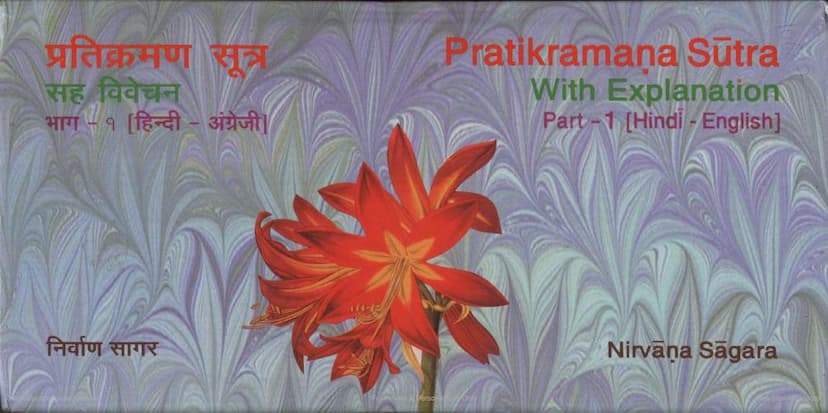Pratikramana Sutra Part 1
Added to library: September 2, 2025

Summary
This Jain text, "Pratikramana Sutra Part 1" by Muni Nirvāṇa Sāgara, published by Arunoday Foundation, is a comprehensive Hindi-English explanation of the Pratikramana Sutra, a fundamental practice in Jainism for self-purification. The book aims to make these essential scriptures accessible to a wider audience, especially those who are more comfortable with the English script and language, including Jain children studying in English medium schools.
Key Aspects and Content:
- Purpose: The primary goal of the book is to provide a clear and detailed understanding of the Pratikramana Sutras, enabling seekers to engage more deeply in the practice of self-correction and spiritual upliftment. It emphasizes learning from a guru as per scriptural injunctions.
- Structure and Content: The book is divided into two parts, with Part 1 focusing on specific sections of the Pratikramana ritual. It includes:
- Introduction to Pratikramana: The preface explains the meaning of "Pratikramana" as "returning back," contrasting it with "Akramana" (attack). It highlights how human attachment to material pleasures leads to an accumulation of karmas, and Pratikramana is the path to redirect the soul towards its true nature.
- Explanation of Six Āvaśyakas (Necessary Rites): The preface provides a concise overview of the six essential daily practices in Jainism:
- Sāmāyika (Equanimity): The effort for emotional balance, crucial for incomplete religious practices.
- Chaturvinsati-stava (Praise of 24 Tirthankaras): Eulogizing the virtues of the Tirthankaras helps in developing one's own virtues.
- Vandana (Obeisance): A symbol of humility, essential for acquiring knowledge and overcoming ego.
- Pratikramana (Confession and Repentance): The act of confessing offenses and returning to one's prescribed conduct, involving confession, repentance, and determination not to repeat mistakes.
- Kayotsarga (Abandonment of the Body): Giving up attachment to the physical body to focus on self-contemplation.
- Pratyakhyana (Renunciation): Abandoning harmful things and accepting beneficial ones for the soul.
- Transliteration and Pronunciation: A significant effort has been made to transliterate the Prakrit and Sanskrit verses into English script, providing diacritic marks and explanations for accurate pronunciation, acknowledging the challenges due to the differences in alphabets and pronunciation rules.
- Detailed Explanation of Sutras: The book systematically presents key sutras of the Pratikramana ritual, including:
- Namokāra Mahāmantra (Navkār Mantra): The core mantra of Jainism, paying obeisance to the five supreme beings (Arihant, Siddha, Acharya, Upadhyaya, Sadhus).
- Pañcindriya Sūtra: Discusses the control over five senses and the virtues of an ascetic.
- Khamāsamana Sūtra: Used for seeking forgiveness and showing respect to gurus.
- Icchākāra Sūtra: A polite way to inquire about the well-being of the guru and ask for alms.
- Abhutthiami Sūtra: Used for seeking forgiveness for any impoliteness shown towards the guru.
- Iriyāvahiyā Sūtra: A confession for sins committed while moving and walking, causing harm to living beings.
- Tassa Uttari Sūtra: The process of further purification after the initial Pratikramana, highlighting the reasons for Kayotsarga.
- Annattha Sūtra: Acknowledging natural bodily actions as exceptions during Kayotsarga.
- Logassa Sūtra: Praising the virtues of the 24 Tirthankaras.
- Karemi Bhante Sūtra: The formal acceptance of the Sāmāyika vow.
- Sāmāiyavaya-Jutto Sūtra: Emphasizing the importance and benefits of observing Sāmāyika.
- Jaga Cintamani Caitya-Vandana: A hymn praising the Tirthankaras and the sanctity of temples.
- Jam Kinci Sūtra: Salutation to all Jain pilgrimage sites and idols in the three realms.
- Namutthuṇam Sūtra: A comprehensive praise of the virtues of Arihantas.
- Uvasaggaharam Stotra: A hymn dedicated to Lord Parshvanatha for removing obstacles.
- Jaya Viyarāya! Sūtra: A prayer seeking spiritual progress and detachment from the world.
- Arihanta-Ceiyānam Sūtra: Performing Kayotsarga for the adoration of idols.
- Kalyāṇa-Kandaṁ Stuti: Praising the Tirthankaras for their beneficial qualities.
- Sansāra Dāvānala Stuti: Praising Lord Mahavira and seeking detachment from worldly suffering.
- Pukkara-vara-divaddhe Sūtra: Saluting the Tirthankaras and the principles of Jain Agamas.
- Siddhānam Buddhānam Sūtra: Praising the Siddhas and Tirthankaras.
- Veyāvacchagāṇam Sūtra: Commemorating deities who assist in the practice of austerity and right conduct.
- Kāvya Vibhāg (Poetic Sections): This extensive section includes various devotional poems and hymns related to different Tirthankaras (like Rishabhanatha, Shantinatha, Neminatha, Parshvanatha, Mahavira), pilgrimage sites (like Siddhachala), and important Jain festivals (like Paryushana). These poetic verses are meant to enhance devotion and understanding of Jain principles through devotional singing and reflection.
- Vidhi Vibhāg (Procedural Sections): This part details the specific procedures for various rituals, including taking morning and evening vows (Paccakkhana) for different durations and types of fasting (like Ekasana, Biyāsana, Āyambila, Tivihāra, Cauvihāra), and the detailed steps for performing the padilehana of the muhapatti (mouth cloth).
- Acknowledgments and Support: The book acknowledges the significant financial and moral support from various individuals and foundations, highlighting the collaborative effort in bringing this publication to fruition.
In essence, "Pratikramana Sutra Part 1" is a scholarly and devotional work designed to be a practical guide for Jains, offering a detailed explanation and transliteration of crucial Pratikramana sutras, interspersed with rich poetic expressions of devotion, thereby aiming to foster a deeper connection with Jain philosophy and practice.